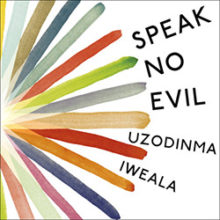 Speak No Evil
Speak No Evil
by Uzodinma Iweala
Published by Harper
Published March 6, 2018
Fiction
224 pgs. • Find on Amazon.com • WorldCat
Reviewed by Stephen O. Murray
April 18, 2018.
Uzodinma Iweala was only 22 when Beasts of No Nation was published in 2005 (begun in a Harvard creative writing course). The horrific fate of child soldiers in an African civil was very harrowing (and Idriss Elba very scary as the commander of a company of children drugged and coerced into battle in the Netflix movie based on it).
Iweala’s new Speak No Evil seems more like a somewhat gawky first novel than Beasts did. Its first half (plus) is a coming-of-age story which Obi, an Igbo father was has been successful in the U.S., brutalizes his culturally American son, Niru, when he discovers gay hookup sites on his son’s phone. An irony is that Niru has yet to hook up, and it is his best friend with whom he could not have sex, Meredith, who looks like a younger Anne Hathaway, who put the applications on to help him along to living his gay self that only she knows of.
I think that Niru must be aware that he could get his father arrested for physical abuse. I recognize that this is a very drastic step, but so is going back to Nigeria to be worked over by a Christian “reparative therapist,” Bishop Okereke. Niru hated going back there even without being the focus of being transformed from being homosexual.
This part of the tale of a surprisingly functional battered youth (who is also a track star and has received early admission to Harvard) reminds me of the exorcism inflicted on Johnnie Ray in Larry Duplechan’s Blackbird (published in 1986, filmed in 2014). JR is also African American, though his father is not committed to being African. Christian(ist)s refusing to believe an offspring of his could be gay, yes.
Niru has some very hesitant relationships with very understanding black gay youths, though I don’t think either of them is physically consummated, so, in a way, his father is right that no son of his could engage in homosexual “abominations.”
The second half of the novel is even more harrowing, even making Niru’s father’s degeneration sympathetic. Being a black gay is dangerous, but just being a male black youth in D.C. turns out to be more dangerous. Meredith was running after Niru when a policeman shot him four times. Posthumously, the boy not interested in girls is transformed by some into being a typical black rapist. Meredith, who narrates the second half, does not challenge this definition of the situation in public, following the directions of crisis information management hired by her parents. I have difficulty believing she would let Niru be smeared after he died in her arms after she had pursued him up a D.C. alley. Also the time structure of flashbacks and a little bit of material from a present six years after the police shooting is jumpy and hard to follow. (I also think the book could have a better title, even See No Evil.)
In addition to showing the violent attempts by black Christian(ist) fathers to change their fearful sons’ sexuality, the book is a strong critique of “reparative therapy,” which has become illegal in some states. (Also see the white Mormon instance in C. Jay Cox’s 2003 Latter Days.)
©2018, Stephen O. Murray

